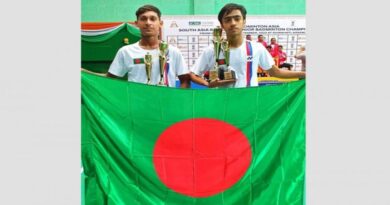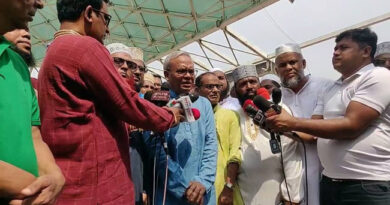Digital Security Act 2018 Strikes Again
In what is certainly one of the more eye-grabbing events this week, on Thursday a lawsuit was filed against more than two dozen people at the newly instituted Chittagong Cyber Tribunal. The accused allegedly contributed towards ‘abusive and derogatory content’ against current Prime Minister Sheikh Hasina and her father, former Prime Minister Sheikh Mujibur Rahman. According to our court correspondent, the said denigrating content was published in an online news media outlet called ‘The Daily Nobojug’. The case was filed on 03 June 2021 and was considered at a hearing on 06 June 2021 by Tribunal Judge S K M Tofayel Hasan on and has now been referred to the Chittagong Metropolitan Police’s Cyber Crime Unit for further investigation. The allocated case number is: 32/2021.
Now the charges are fairly serious but at a first glance, someone who is unaware of Bangladesh current socio-political state might dismiss this lawsuit as a common occurrence. And to a certain extent, he would be right, for the courts of Bangladesh are inundated with lawsuits in general. What sets this one apart however is that this lawsuit has been filed under the Digital Security Act 2018, Sections 25 and 31 to be exact.
Now, this lawsuit here is uncommon in the sense that Bangladesh happens to be one of the many nations where digital laws, cybercrime (and laws against them) were not as prevalent as other more technologically developed countries. Indeed before the introduction of the now reformed Digital Security Act 2018, Bangladesh legal system was largely ignorant of monitoring digital activities e.g. internet traffic, social media portals visa-a-vis, where cybercrime usually tends to originate from. They largely operated under the rather meek ‘Bangladesh Information & Communication Law 2006” (As amended in 2009)’. Up until the aforementioned, Digital Security Act of course.
Fast forward into 2021 and the ‘Digital Security Act 2018’ is a topic of hot debate, with online activists, human rights activists, editors, writers, free press and media criticising the law, referring to it as the ‘Black Law’. There have been 4000 cases in two years under this statute. They cite that this is yet another attempt at ‘stifling the freedom of speech’. Often critics also refer to it as a ‘bone-chilling doctrine’, despite the government maintaining that it is a law introduced for ‘those who indulge in dissent far too often and unnecessarily’. A vast majority of the people debating the law have criticised the government for introducing yet another tool in which to silence its critics. Indeed some of the words of caution, introduced within the Digital Security Act do leave room for debate and are quite concerning. For instance, there is a very specific ban mentioned in the Act which prohibits anyone from “spreading negative propaganda” about the country’s 1971 war of independence and its founding leader Sheikh Mujibur Rahman. Anyone found guilty under this new act face an assortment of legal consequences including up to 14 years of jail time.
That is the predicament awaiting the 29 people who have been accused in this lawsuit. The plaintiff here one Mr Rasel Sarkar was gracious enough to participate in a very brief interview with our court correspondent. He states that the accused have, “deliberately and without remorse, gone about besmirching the name of our founding father Bongobandhu and his daughter, our current revolutionary leader Prime Minister Hasina. We need to stand up to bullies who use the free press and online media outlet to spread false rumours and propaganda against the honourable men and women who have ruled and currently rule our country.” The plaintiff also had a few choice words for the accused but we have omitted them in the interest of keeping this space clean for our readers.
Now 29 men accused are as follows, starting with the primary accused
Esrat Rashid (Editor, Daily Nobojug), Ali Amin (Publisher, The Daily Nobojug), Johnny Joseph de Costa (Assistant Editor, Daily Nobojug), Nurul Huda (Senior Co-Editor, Daily Nobojug), Noor Mohammad (Adviser), Mukit Chowdhury, Abu Sayed, Ahsanul Huda Sarkar, Musa Ahmad Jaigerder, Md. Jakir Hossain, Mizanur Rahman, Md. Abdul Razzak, Subarna Rahman, Md. Razim Hossain, Kazi Mosharraf Hossain, Ahsanul Kabir, Abu Bakar Siddiqui, Md. Shahidul Islam, Romana Akter Rumki, Md. Maraz Miah, Md. Ashif Hossain, Muminur Reza Chowdhury, Md. Masum Sajjad, Md. Shaim, Md. Shahidul Islam Jaigirder, Abdul Wahid Chowdhury, Md. Al-Amin Kaiser, Shiplu Kumar Barman, and Ariful Haque Arif.
As our readers can probably imagine, it was difficult to get a hold of the accused at all. Our correspondent managed to track down some of them, but it appears that they are currently residing abroad.
Our correspondent next approached the Home Ministry for comments on the case, but a spokesperson rudely refused to let us speak to any present official instead citing that the Home Ministry does not comment themselves with ‘individual incidents’.
Our court correspondent was also refused entry into the local Police Station handling the primary investigations for this lawsuit. But more information will be available as this incident is slowly filtered out for the media to evaluate and report on later. Thus we urge patience from our readers for now as there is potentially more to follow.



